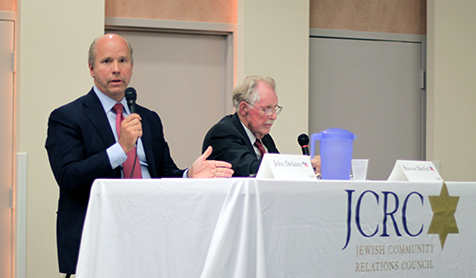ROCKVILLE — Republican Rep. Roscoe Bartlett and Democrat John Delaney on Sunday night cast themselves as political independents in the race for Maryland’s 6th Congressional District during a debate that still featured the kind of partisan bickering dominating national politics.
Sunday night’s event, hosted by the Jewish Community Relations Council of Greater Washington, marked the third time the major-party candidates in Maryland’s 6th Congressional District have debated each other. The debate drew about 225 people to Temple Beth Ami in Rockville.

In their race to represent a district that stretches from Oakland to Gaithersburg, both candidates pointed to times when they had exhibited bipartisanship and embraced positions uncommon to their parties.
Bartlett stood by the more than 30 votes he cast to repeal President Barack Obama’s health care reform law, but acknowledged that Republicans “do not have a well-developed alternative.” He defended his membership in the House Tea Party Caucus as “supporting a dialogue on the importance of the Constitution,” but added that he reaches across the aisle “more than probably any other Republican.”
Delaney twice described himself as a political outsider, having won a divisive primary battle against state Sen. Robert Garagiola, D-Montgomery, the pick of most of the Democratic establishment. Delaney also backed an independent redistricting committee to avoid the kind gerrymandering that brought him the more Democratic district that he’d like to represent.
“I don’t come to the table as someone who supports redistricting solely for political reasons,” Delaney said. “I think you’re always better off being on the right side of the issues, even if it causes short-term pain.”
While Bartlett and Delaney have largely avoided attacking each other so far during their debates, Sunday night proved an exception.
Delaney accused Bartlett of spending his entire re-election campaign attacking Delaney’s business record, and said it was possible the congressman “hates free enterprise.”
“The American people deserve honesty,” Delaney said. “If you’re not going to get honesty in your campaigns, how are you going to get it when you’re in office?”
Delaney also criticized Bartlett for signing a pledge not to raise taxes, saying it “eroded integrity of the government.”
Bartlett tried to distance himself from a Republican Party mailer that claimed Delaney’s company, commercial lender CapitalSource, bought mortgages and foreclosed on families, yet still said Delaney’s business record ought to be examined. He compared campaign attacks to dreading to drink cod liver oil as a child.
“What one has to do in a campaign, I hate,” Bartlett said.
After three debates, the candidates have settled into what could be described as signature debating styles. Bartlett leaned on the table in front of him, tying his answers to personal anecdotes and the experience he said he has gained as a 10-term congressman. Delaney sat upright with his hands clasped, routinely bringing up his private sector experience and punctuating his remarks with controlled hand gestures.
Although the debate’s atmosphere occasionally soured, the candidates also drew spontaneous laughter from the audience.
Pressed on whether he was planning to move into the district should he defeat Bartlett, Delaney paused, flashed a smile and said, “No.” He later added that Google claimed he lives eight seconds outside the district.
Bartlett used humor to deflect Delaney’s attacks on his voting record, including negative votes on raising the minimum wage and ensuring equal pay for women.
“I couldn’t be married with Ellen Bartlett and vote against equal pay for women,” Bartlett said.
But the candidates also found occasional common ground — even if they took different paths there. Bartlett and Delaney both opposed Question 7 to expand gambling in Maryland. Delaney said he took issue with linking gambling revenue to education funding, while Bartlett opposed it for moral reasons.
“I just don’t think you should run your government on sin taxes,” Bartlett said. “Are we going to legalize prostitution and tax that?”
Bartlett and Delaney also agreed U.S. aid to Israel should remain intact, but spoke carefully in response to a hypothetical military conflict between Israel and Iran and the ongoing conflict in Syria.
“When I was a little boy, the world was made up of black and white squares on a checkerboard,” Bartlett said. “But the older I get, the more gray squares I see.”
Bartlett and Delaney have used similar strategies to court Jewish voters, who comprise a large, active voting group in the county. Both campaigns have created Jewish advisory groups, and Delaney also traveled to Israel this summer during a trip organized by the Community Relations Council.
Libertarian candidate Nickolaus Mueller was not invited to the debate because his poll numbers are low.
Bartlett and Delaney will debate four more times before Election Day, including a televised appearance on WUSA at 7 p.m. Tuesday.


You must be logged in to post a comment.